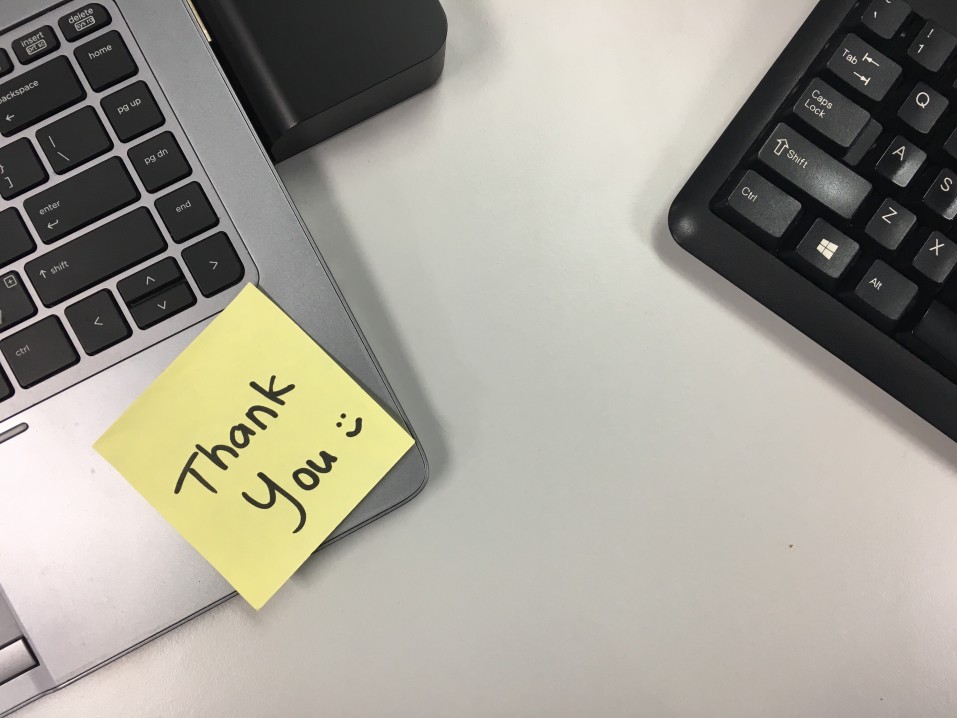Employee Appreciation Day happens on the first Friday of every March. It's a day when managers express their gratitude to employees, but it's also the most important time for skyrocketing the happiness and productivity of your team.
In an article titled "The Amazing Effect of Thank You," Jan Tegze explains the connection between gratitude, happiness, and productivity:
"Happiness makes people more productive at work, according to research from the University of Warwick, and this happiness led to a 12 percent spike in productivity, while unhappy workers were 10 percent less productive. (Source: study)"
The correlation between employer gratitude, happiness and productivity might come as a surprise, but it's no surprise to the Danish. Self-proclaimed "Chief Happiness Officer," Alexander Kjerulf (who is also a Dane), says we can explain the magical combination that leads to workplace happiness with an obscure Scandinavian word: "arbejdsglaede" (ah-bides-g'lil).
What Is Abejdsglaede?
The true heart of Employee Appreciation Day is all about arbejdsglaede (not just material gifts). In his motivational talks, Alexander Kjerulf says that arbejdsglaede literally means "happiness at work." In Denmark, when you achieve arbejdsglaede:
- You feel great in your job.
- You like what you do.
- You're proud of your work product.
- You enjoy your colleagues and they enjoy you.
- You wake up on Monday, and say "Yay! I can't wait to go to the office!"
Only Scandinavia Has the Concept of Abejdsglaede
The only countries with a specific word for "happiness at work" are Denmark, Sweden, and Norway. For example, Japan doesn't have a word like this. Instead, they have "karōshi," which means "overwork death." In the United States, we refer to our jobs as "the grind."
Kjerulf points out that many people think arbejdsglaede is a joke. These people argue that "work isn't enjoyable." They say, "It can't be fun, and it certainly won't make you happy! That's why we get paid to do it!"
But really? Are you just working for a paycheck? According to arbejdsglaede, the reasons we work are a lot more interesting (and fun) than money alone. In truth, we work so we can feel happy and fulfilled!
70 Percent of Workers Agree: The Most Meaningful Recognition they Receive Has No Monetary Value
Several years ago, a study surveyed 1,200 United States employees about workplace fulfillment. The results showed something exciting: The way employees feel has a greater impact on their happiness than the money they earn. In fact, approximately 70 percent of respondents said that their most meaningful recognition at work had nothing to do with money. Here's what the study found:
- 83 percent of employees agreed that being appreciated for their contribution felt more fulfilling than a reward or a gift.
- 76 percent agreed that praise from a coworker was "very" or "extremely" motivating.
- 88 percent agreed that praise from a manager was "very" or "extremely" motivating.
- 90 percent agreed that fun work environments were "very" or "extremely" motivating.
Jan Tegze says that when managers express gratitude, they improve their relationships with employees:
"Encouraging the practice of gratitude at work has a wide range of benefits, starting with making the manager a better leader if he chooses to express his gratitude, and continuing to improve the relationships between team members, colleagues, and co-workers."
Could Arbejdsglaede Be as Simple as a Slice of Pizza?
If you're not on board with arbejdsglaede after reading the statistics above, a study that tested the effects of promising pizza to employees could change your mind. Betsy Mikel on Inc. described the study:
"After the first day, those who had been promised pizza had been more productive than the control group by 6.7 percent. And here's what's even more surprising. Those who were promised a compliment -- which was simply a text message from the boss that said, "Well done!" -- were neck-and-neck with the pizza group at 6.6 percent. The worst motivator? The cash bonus group, whose productivity increased only 4.9 percent compared with the control."Another telling indicator came a week after the pizza study. The cash bonus group experienced a 6.5 percent drop in productivity. Melissa Dahl on The Cut comments: "For the week overall, the cash bonus ended up costing the company more and resulted in a 6.5 percent drop in productivity. From the employer's perspective, a cash bonus is worse than offering no incentive at all."
What's important to note is the fact that having a "pizza party," with everyone joining around a table to eat pizza, drink soda and chat, is a healthy, community-building experience. The team gets to (1) relax and enjoy some tasty food, (2) appreciate one another, (3) feel recognized for a job well-done, and (4) celebrate their achievements.
Chasing Abejdsglaede the Google Way
Google doesn't use the word abejdsglaede, but it understands that employee happiness is vital. The tech giant received a 4.4-star (out of 5) review on Glassdoor and 89 percent of the reviewers said they would recommend working at Google to a friend.
To foster workplace happiness, Google gives its employees "material benefits," but it also uses "arbejdsglaede-fostering principals."
The "Material Benefits" Google Gives Its Employees
The perks that Google gives employees could inspire new ideas for your own company:
- Free transportation to work from San Francisco.
- Permission to bring pets to work.
- Free gourmet snacks and drinks.
- Employee fitness center.
- Free classes and lectures from global thought leaders.
- Extra time off for new parents.
- Massage therapy sessions.
- The ability to spend 80 percent of their work time on their primary jobs and 20 percent "passion projects" that they think will help the company.
- Free books to take home and read.
- Up to three months of unpaid leave to participate in political, volunteer or charity projects.
- Joining a great community in which ex-Googlers and current Googlers are known to link up with each other all over the world in a constantly growing and supportive community.
- Support for career development.

Google's "Arbejdsglaede-Fostering Principals"
The perks above are amazing, but they're just material benefits. By looking through the lens of arbejdsglaede, "free stuff" helps, but it's probably not the secret to employee happiness at Google.
In the book "Work Rules," Google HR executive Lazlo Bock describes the ten rules that embody Google's workplace culture. Arguably, these rules create the support for abejdsglaede at the company:
- Give your work meaning: Workers need to feel like the things they are doing have meaning, benefit others and/or have some kind of palpable and positive impact on others.
- Trust people: Employees are encouraged to use a suggestion box at Google, which they know will be read and acted on. Managers should engage and interact with their employees regularly to ask how things can be improved. This helps the employees feel trusted, involved and happier.
- Hire employees who are better than you: Every hire should be someone who is better than the team. Each new person should lift the team up, not pull them down. In fact, Bock believes that a team is better off being one man down and scrambling to pick up the slack than replacing the missing person before the right candidate appears.
- Confront performance setbacks as opportunities for growth: Support employees to know that every "mistake" or "performance setback" is an opportunity for growth and development. Have developmental conversations frequently and make them feel safe and productive. The attitude should be, "How can I help you be more successful."
- Focus on your "best performing" and "worst performing" team members: Study your most successful employees and use them as examples to teach the rest. Approach your struggling employees with compassion, try to find a better role for them, and if the relationship isn't working, end the relationship so they can find happiness with a team where they're not the "worst performers."
- Be generous and frugal: Many things are inexpensive, like saying "thank you" or ordering pizza for the team. Yet they have a lot more value than the cost. Other times, when an employee needs to take leave for a new baby, more money will be available to be generous with paid time off and other perks.
- Pay unfairly: According to Bock, 90 percent of the value comes from the top 10 percent of your team members. Employers should reward them accordingly while being generous with public recognition for the entire group. Celebrating team achievements is vital.
- Nudge: Take a look around to see which direction the team is nudging you. Does the culture say to send snarky emails or encouraging ones? Consider which way you are nudging the conversation and make sure it's in the direction of a happier, more productive team.
- Manage rising expectations: You're better off saying that you plan to "experiment with a few ideas" instead of promising absolute success. Most achievements require some backward steps, and this approach will turn potential critics on the team into supporters who give the benefit of the doubt.
- Enjoy: Enjoy these supportive work rules and the community they build. Then go back and do them again.
Here's what Warwick University says about Google's commitment to employee happiness:
"Companies like Google have invested more in employee support and employee satisfaction has risen as a result. For Google, it rose by 37%; they know what they are talking about. Under scientifically controlled conditions, making workers happier really pays off."

How Will You Achieve Arbejdsglaede on Employee Appreciation Day?
During the holidays, we give presents to the people we love. But everyone knows that the "reason for the season" is about sharing time and appreciating our loved ones. Employee Appreciation Day is the same. This is the day to express your appreciation to employees in heartfelt ways -- so they can experience arbejdsglaede!
At 2020 On-Site a lot of companies make an appointment for our mobile vision clinics to arrive at their offices on Employee Appreciation Day so their team members can get eye exams and stylish new glasses. Overtures like that go a long way to show your employees how much you care.
In addition, it's important to remember why we do nice things on Employee Appreciation Day. The material benefits are excellent and needed, but how is your company measuring up in the non-material world of arbejdsglaede? Employee Appreciation Day is about showing employees that we value their contributions because without them, we couldn't achieve anything -- and we certainly wouldn't be happy!
Interested in adding on-site eye care and eyewear to the ways you appreciate your employees? Contact us at 2020 On-site.

Sources
https://medium.com/@jantegze/the-amazing-effect-of-thank-you-e0a25c91b864
https://warwick.ac.uk/newsandevents/pressreleases/new_study_shows/
http://kjerulf.com/
https://en.wikipedia.org/wiki/Kar%C5%8Dshi
https://www.youtube.com/watch?v=6uxu-wiYsYU&t=143s
https://www.psychologytoday.com/us/blog/mind-the-manager/201306/new-employee-study-shows-recognition-matters-more-money
https://www.inc.com/betsy-mikel/pizza-trumps-cash-bonuses-to-boost-productivity-legitimate-study-finds.html
https://www.thecut.com/2016/08/how-to-motivate-employees-give-them-compliments-and-pizza.html
https://www.theguardian.com/notesandqueries/query/0,5753,-50504,00.html
https://www.youtube.com/watch?v=6uxu-wiYsYU&t=143s
https://www.inc.com/business-insider/best-google-benefits.html
https://www.theguardian.com/technology/2015/apr/04/how-to-get-ahead-at-work-10-tips-from-googles-head-of-hr
https://www.forbes.com/sites/pavelkrapivin/2018/09/17/how-googles-strategy-for-happy-employees-boosts-its-bottom-line/#21bda39f22fc
https://www.glassdoor.com/Reviews/google-reviews-SRCH_KE0,6.htm




